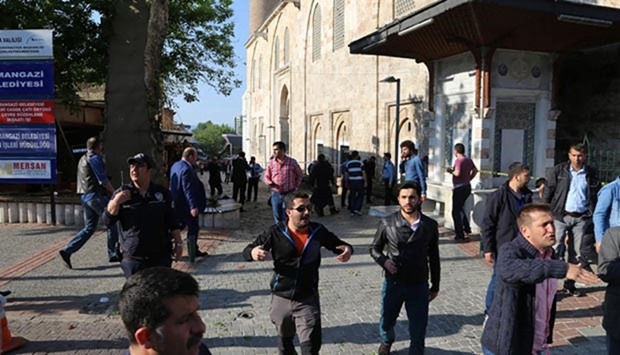A suicide bomber blew herself up in the Turkish city of Bursa on Wednesday, wounding 13 people in the latest attack to strike the country, officials said.
The bombing took place near Bursa's 14th century Grand Mosque, a historic symbol of the city that was the first capital of the Ottoman empire.
"A woman packed with a (bombing) mechanism believed to be a suicide bomber blew herself up. Seven citizens were injured according to initial findings," said a statement from the local governor's office.
Security sources confirmed that the blast was a "suicide attack", while Turkish media identified the bomber as a 25-year-old woman.
Nobody has yet claimed responsibility for the blast.
But Turkey remains on high security alert after a series of deadly attacks since last summer blamed on the Islamic State (IS) jihadist group and Kurdish rebels.
The powerful explosion smashed the windows of shops near the mosque, and television footage showing the injured being treated in ambulances.
Police sealed off the area for investigation.
Health Minister Mehmet Muezzinoglu said 13 people had been injured, none of them critically.
Most of the injuries were wounds from broken glass and hearing problems following the strong explosion, he added.
US embassy warning
Wednesday's attack came just a day after the US embassy in Ankara issued a new security alert for Turkey.
"The US government continues to receive credible indications that terrorist groups are seeking opportunities to attack popular tourist destinations throughout Turkey," the embassy said on its website.
"The US embassy reminds US citizens that foreign tourists in Turkey have been explicitly targeted by terrorist organisations, and advises US citizens to be mindful of the potential for danger in crowded public areas and at popular tourist destinations."
Bursa, once a major stop on the Silk Road trade route linking Asia to Europe, is an industrial hub and Turkey's fourth largest city with a population of 2.7mn.
It lies across the Marmara Sea from Istanbul, the largest city in Turkey that has often been the target of attacks.
Ankara launched an offensive against the outlawed Kurdistan Workers' Party (PKK) after the collapse in 2015 of a two-year ceasefire in a renewed conflict that has left many dead in the mainly Kurdish southeast of the country.
The conflict has also struck the heart of the country, with two attacks that killed dozens of people in the capital Ankara in February and March that were claimed by a group calling itself the Kurdistan Freedom Falcons (TAK) - a radical splinter group of the rebel movement.
The PKK, listed as a terror group by Turkey and its Western allies, took up arms in 1984 with the aim of establishing an independent state for Turkey's Kurdish minority, although in recent years its demands have focused on greater autonomy and cultural rights.
Turkey has also stepped up offensive against IS jihadists, and killed almost 900 alleged IS members in Syria since January through artillery fire and air raids, the state-run Anatolia news agency said on Monday, citing military sources.
A member of the US-led international coalition fighting IS, Ankara has in recent months cracked down on its sleeper cells throughout the country after the deadly attacks.
Four Israelis and an Iranian were killed in a suicide attack on March 19 in Istanbul, while a January attack in the city's ancient touristic heart killed 11 German tourists.
Both of those bombings were blamed on the IS group, which was also behind the deadliest attack in Turkey's modern history - a double suicide bombing in Ankara that killed 103 people in October last year.

